| |
2011 Spring Festival Tea Party of BAC Holds Successfully
Early in the morning of Jan. 18, 2011, distinguished guests from all circles gathered in the international conference hall of the sixteenth floor of China Merchants Tower. Accompanied by lively background music, they greeted each other and talked joyfully with the whole conference hall filled with joyful and celebrating atmosphere. At 10:00 a.m., BAC 2011 Spring Festival Tea Party was unveiled, chaired by Professor CHE Pizhao.
First, Secretary General WANG Hongsong made work report for the year of 2010. She introduced in detail the main working outcomes in 2010, which covered arbitration case and performance, prolonging of terms of commission members and arbitrators and change of members, promotion and exchange with the outside, training and theoretical study, software development and office building construction, etc.
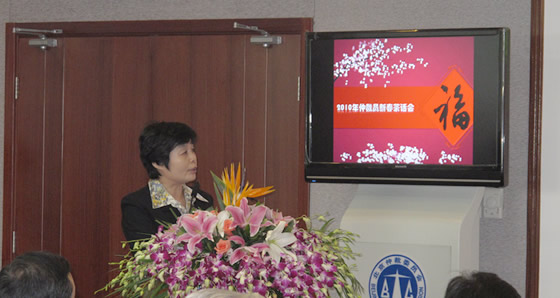
Secretary General WANG Hongsong is making the work report
In her introduction to cases and performance, she pointed out that the category of case accepted by BAC had changed, i.e. cases of highly specialized and complicated and cases involved large disputed amount and new type legal relations were increasing. This can be seen from the 9.3 billion RMB involved in cases in 2010, increasing by 500 million RMB compared to 2009. Averagely, the disputed amount of each case is 5,939,000 RMB, up 23.73% compared to 2009. In 2010, two cases were successfully settled through mediation, which involved complicated disputes and many interconnected cases. Co-mediation was adopted in one case. Besides, BAC and Beijing Municipal Commission of Housing and Urban-Rural Development discussed and agreed on quick settlement of project related disputes through Co-mediation, and successfully settled a case in January 2011.This not only helps BAC find methods to quickly settle project related disputes, gives full play to the role of arbitration and mediation in settling project related disputes, but also helps find new ways of settling disputes in multi-methods through cooperation between BAC and related departments.
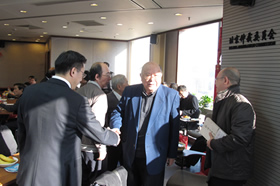 |
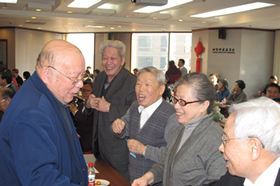 |
Chairman JIANG Ping greeting arbitrators |
Chairman JIANG Ping greeting honorary arbitrators |
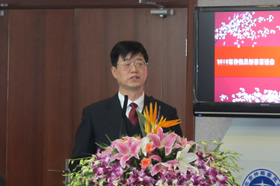 |
 |
Professor CHE Pizhao presiding over the conference |
Vice President WU Zhipan and Commissioner ZHANG Weiying discussing the work report |
With regards to promotion and exchange with the outside, BAC has it involved in many international or regional conferences. The themed speech made to the seminar on China’s arbitration that was held in Milan in March and keynote speech titled China’s Experience in Arbitration that was made in Cambridge University in June were highly appreciated by professionals of this circle in Europe.
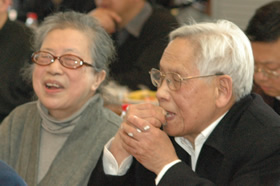 |
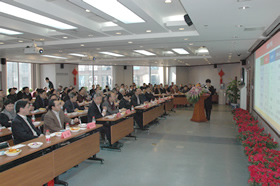 |
Honorary arbitrator LIU Huishan and WEI Yaorong |
Secretary General WANG Hongsong is making the work report |
Looking forward to the future, Secretary General WANG Hongsong brought forward the next goal for BAC’s development: develop BAC into not only an arbitration commission of internationally first class, but also a multi-methods dispute settlement center integrating arbitration, mediation, and DB, a center of information exchange, research and training, and promotion, and an important force in driving the development of multi-methods dispute settlement in China. BAC expressed appreciation to six honorary arbitrators XIAO Xun, ZHANG Yaozong, LIU Huishan, WEI Yaorong, YAO Zhuang, FEI Zongyi for their contribution over the decade.
After that, arbitrator WANG Jialu on behalf of Development Committee of Arbitrators looked back on various work of BAC and announced the 2011 working plan. As an important form of autonomous management by arbitrators, Development Committee made outstanding contribution in promotion of arbitration and BAC, and in consolidation and innovation.
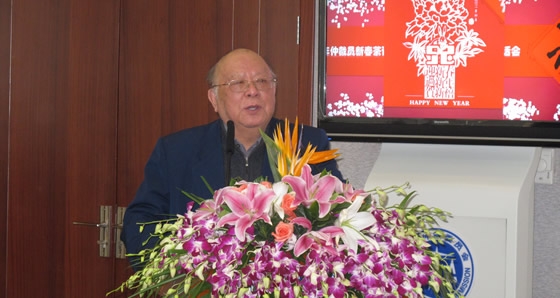
Chairman JIANG Ping addressing the conference
Following that was Chairman JIANG Ping’s addressing that was highly expected. Mr. JIANG described the development of BAC as the growth of a person. He said, over the past 15 years, BAC underwent a course from childhood to adult. At early stage since its establishment, BAC has been growing in its “height” mainly, which can be seen from the rapid increase of cases accepted before 2007; and over the recent years, BAC has been growing in its “strength” with adequate progress achieved in improving of the agency, recruitment of staff member, and training for arbitrators, etc. BAC now at its adulthood shall strengthen its growth in “mentality”. Besides, Chairman JIANG Ping also expressed his expectation that now that arbitrators had undertaken to concentrate on the settlement of arbitration cases, they should make good on promise with full heart and soul, and deal with arbitration cases. In the end, he emphasized again that the vitality of arbitration service lies in arbitrators and that of arbitrators lies in its expertise and earnest.
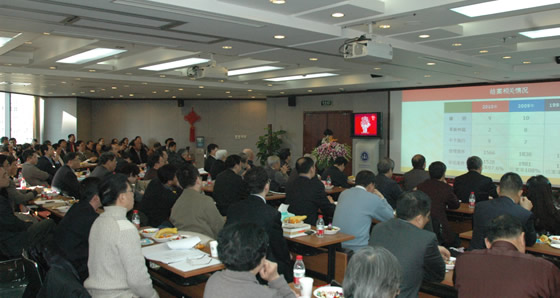
Guests hearing the work report made by Secretary General WANG Hongsong
After the Tea Party, a lottery draw was offered and 17 arbitrators won prize of various levels. The conference closed with pleasures and joys.140 guests presented the Tea Party, including members of the Legislative Affairs Committee of the National People’s Congress, members of BAC, and arbitrators.
(Written by: WANG Ze, Photographer: Lv Xin)
Attachment:2010 Work report of BAC
2010 Spring Festival Speech of Director Jiang Ping
The BAC held the third mediaiton training program successfully in cooperation with Pepperdine University Straus Institute.
From Jan. 13th to 17th, sponsored by U.S.-China Legal Cooperation Fund, the BAC and the Straus Institute for Dispute Resolution of Pepperdine University jointly organized a mediation training workshop. The managing director of Straus Institute, Peter Robinson, has chaired the workshop at the BAC’s invitation.
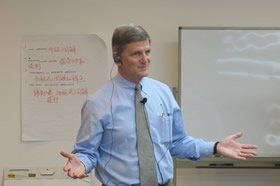 |
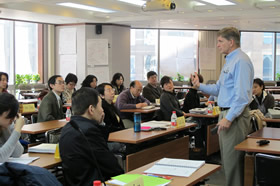 |
Self Introduction |
At the Workshop |
In recent years, while a harmonious society requires a flexible and effective dispute resolution, a strong encouragement of mediation emerged in China because its identified flexibility and effectiveness. The BAC carried out this workshop with the help from Straus Institute because the BAC independent mediation practice has revealed what hindered the development of mediation in China—the lack of practical skills researches. Therefore, this workshop intended introducing western mediation practical skills and experiences. In the beginning of the workshop, the instructor threw out a “Theory of Four Stages in a Dispute Resolution Process”, which strikes participants’ mindset towards dispute resolution. Such theory structuralizes mediation and other three channels—negotiation, arbitration, and litigation.
In the following days, the instructor had unfolded the Convene, Opening Statement, Communication, five stages of mediation, which were developed after years of practice in U.S. The instructor characterized the function of these five stages by diverse case studies and mock mediation. On the other hand, the participants who had experienced the different strategies in mock mediation were gained insights of mediation skills. “Such vivid exercises help see how tiny differences in a mediator’s speaking can result incredible outcomes.” one participant said. Moreover, when the class went into the negotiation part, participants were at their most impressive responses when the instructor shifted their zero sum negotiation mindset into a win-win negotiation brainstorming. In addition, the instructor displayed various communication techniques showing how to get control of each step in a negotiation process amazed all the participants, indeed. The active interactions, the instructor’s dedication and insights, and thoughtful participation of the class made a fruitful five days’ event. It is a reciprocal training program for both the participants and the instructor. While the class may have a better insights on how to carry out mediation more effectively in China, their shared experiences of dealing with the real Chinese disputes also helped the instructor know more information about what adaptations can made to better improve his teaching in China. At the end of the training, participants expressed their appreciation; and called the BAC to frequently gather such training group. Also, the instructor addressed his best wish for the class by stating “Harmony never implicated a world without conflicts. What a harmonious society refers shall be a society with a functioning dispute resolution to solve the conflicts, with the effectiveness, the creativity, and the convenience. I wish my insights and knowledge could help when you are to start a mediation career.”
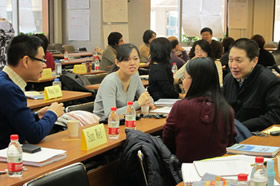 |
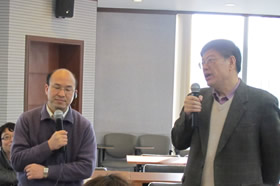 |
Trainees had an impassioned discussion |
Trainees joined in interactive communication |
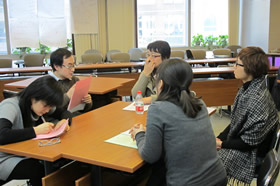 |
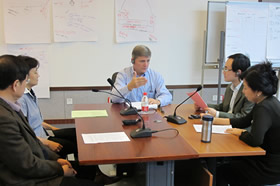 |
Simulated mediation practice |
The lecturer demonstrates how to mediate |
All the 25 participants were special invited due to the limitation in the scale. Most of which are universities’ teachers from five provinces; and others are practitioners related the mediation field in China.
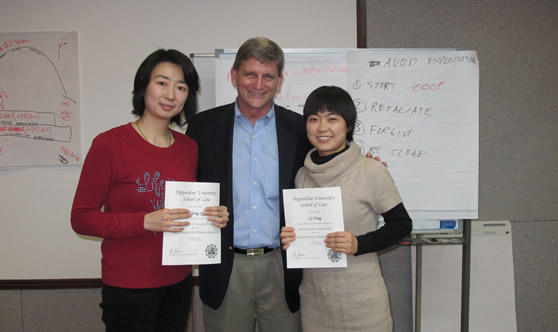 |
Prof. Peter Robinson awarded certificates to trainees |
| |
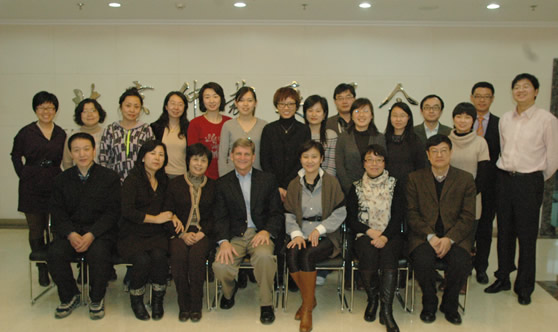 |
All trainees take a group photo to mark the occasion |
Feedbacks:
——“Both the contents and the teaching manners extended my horizon, and were beneficial for my work.”
——“Excellent class. The researches and practice of mediation in China are different from other countries.”
——“Mediation is not only an art, but also a ‘social ability’. Pretty Good! It’s really pushed the edge of my horizon!”
——“The course help us see the conception and the skills of mediation. It’s hard to tell all the benefit of the class in short words; but, I will definitely recommend it to my friends”
——“The professor is full of dedication. The class is very interesting. The teaching manners are highly interactive. Learning from experts makes certain improvements for us, and even for the nation.”
——“I’ve gained a lot. Now I have an innovative perspective towards mediation. The class actually opened up my mind. The contents comprised theories and practices. That benefits my future work, indeed.”
|